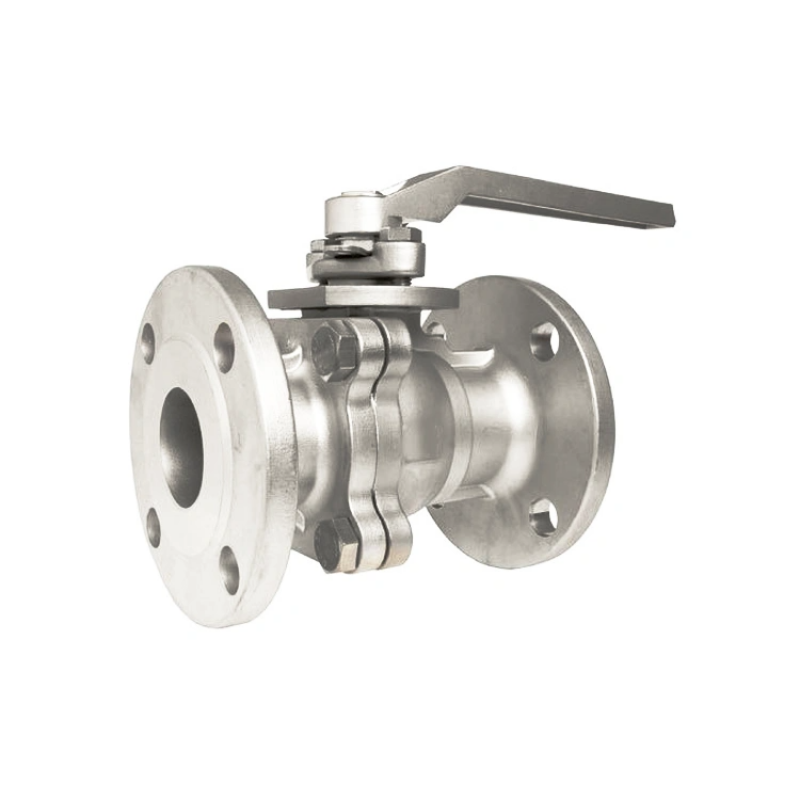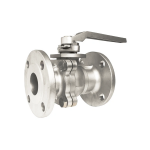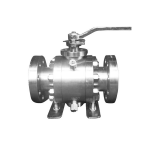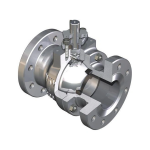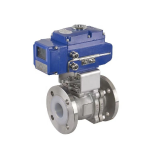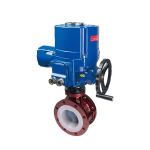Specification
High-strength Titanium Alloy Forged Ball Valves (3-inch/4-inch/5-inch): An Innovative Solution for Corrosion-Resistant Fluid Control
I. Core Attributes: Performance Breakthrough of Titanium Alloy
Material System:
- Body Material: Forged from titanium alloy (TA2/Ti-6Al-4V), with a density of only 4.51g/cm³ (approximately 57% of steel), tensile strength ≥685MPa, yield strength ≥345MPa, combining lightweight and high-strength characteristics.
- Corrosion Resistance: In strongly corrosive media such as seawater, aqua regia, and chlorides, the corrosion rate is ≤0.001mm/year, far exceeding stainless steel (316L corrosion rate ≈0.05mm/year).
- Low-Temperature Performance: Maintains an elongation rate of ≥15% in liquid nitrogen at -253°C without cold brittleness, complying with ASTM B381 standards.
- Diameter Specifications: 3-inch (DN80), 4-inch (DN100), 5-inch (DN125), with support for customized diameters (advance communication required).
- Pressure Rating: Covers low, medium, and high pressures (specific values not clearly marked, can be customized according to working conditions), with a shell pressure-bearing capacity ≥4.0MPa (measured data).
- Connection Methods: Default flange connection (ANSI B16.5 standard), optional butt weld (BW) or threaded (NPT) connections, suitable for pipeline systems in chemical and marine engineering.
- Driving Methods: Standard hydraulic drive (response time ≤2 seconds), optional manual, electric, or pneumatic actuators with remote control support.
- Testing Standards: Passed ultrasonic testing (UT) and penetration testing (PT) to ensure no internal cracks, inclusions, or other defects; provides material reports (PMI testing) and pressure test reports (1.5x nominal pressure hydrostatic test).
- Customization Services: Supports full-process OEM/ODM/OBM customization, including valve body lining (e.g., PTFE coating), surface anodizing (hardness increased to HV300+), and brand logo engraving.
Product Overview
Product Process: The Precision Manufacturing of Titanium Alloy Forging
(1) Forging Process: The Transformation from Titanium Ingot to Valve Body
- Vacuum Melting: Uses a vacuum consumable arc furnace (VAR) to melt titanium alloy ingots, with impurity content controlled at C≤0.10%, N≤0.03%, H≤0.015% to ensure material purity.
- Isothermal Forging: Isothermal die forging at 900-950°C with a deformation rate ≤0.1mm/s, allowing metal flow lines to distribute along the valve body contour, enhancing mechanical properties by over 20% and avoiding coarse grain issues in traditional forging.
- Stress Relief Annealing: After forging, annealing at 650°C for 2 hours to eliminate internal stress, with a grain size reaching ASTM Grade 7 to ensure long-term service stability.
(2) Precision Machining and Surface Treatment
- 5-Axis Machining: Utilizes DMG MORI 5-axis machine tools, with valve seat sealing surface machining accuracy reaching IT6 grade and surface roughness Ra≤0.4μm, achieving 0.002mm-level error control with laser interferometers.
- Sealing System:
- Soft Seal: PTFE or PEEK valve seats with a leakage rate ≤0.5cc/min (API 598 standard);
- Metal Hard Seal: Titanium alloy surfacing with tungsten carbide (hardness HRC65+), suitable for particle-containing media, achieving zero leakage (API 6D VI grade).
- Surface Strengthening: Optional ion nitriding (TiN coating) increases surface hardness to HV1200, extending wear life by 3 times, suitable for high-frequency switching scenarios.
(3) Full-Process Quality Control
- Material Traceability: Each titanium ingot has a unique heat number, fully traceable from melting to finished product, supporting third-party testing (e.g., SGS).
- Pressure Testing: 100% shell pressure testing (medium: water or kerosene) with no leakage under pressure for 30 minutes; helium leak detection for sealing testing with a leakage rate ≤1×10⁻⁹Pa·m³/s (suitable for high-purity media scenarios).
Valve Details
Product Description: Outstanding Performance in Extreme Environments
(1) Marine Engineering Field
- Seawater Desalination System: In seawater pipelines with chloride ion (Cl⁻) concentration ≥20,000ppm, the corrosion-resistant service life of the titanium alloy valve body exceeds 20 years without additional anti-corrosion treatment, reducing maintenance costs by 50% compared to 316L stainless steel.
- Ship Ballast Water System: The titanium alloy ball valve operates flexibly at -30°C without ice jamming risk, certified by DNV GL, and suitable for polar vessels.
(2) Chemical and Pharmaceutical Industries
- Strong Acid and Alkali Media: In hydrofluoric acid (HF) and hydrochloric acid (HCl) pipelines, the corrosion resistance of the titanium alloy valve seat is 1.5 times that of Hastelloy, with a leakage rate below the detection limit to ensure operator safety.
- High-Purity Fluid Control: The pharmaceutical industry’s sterile water system uses electrolytic polishing (surface roughness Ra≤0.2μm), complying with FDA and GMP standards to avoid media contamination risks.
(3) Energy and Aerospace
- Liquid Hydrogen Storage and Transportation: The titanium alloy ball valve passes NASA’s low-temperature impact test at -253°C ultra-low temperature, with no brittle fracture in the valve body and stable sealing performance, suitable for aerospace fuel filling systems.
- Geothermal Energy Development: In high-mineralization geothermal fluids (total dissolved solids TDS≥30,000ppm), the titanium alloy has excellent resistance to sulfide stress corrosion (SSC) and hydrogen-induced cracking (HIC), with a service life 3 times that of duplex steel.
Application
Supply Chain and Services: Customized Solution Experts
- Delivery Capacity: Regular specifications (3-inch/4-inch/5-inch) can be delivered within 10 days, and the delivery cycle for customized orders (e.g., special diameters, driving methods) can be negotiated, with a monthly production capacity of 10,000 sets.
- After-Sales Service: Provides a 3-year extended warranty, including free corrosion detection and lubrication maintenance; global technical response within 48 hours, with on-site commissioning support (for key projects only).
- Cost Advantage: Although the initial procurement cost is 30-50% higher than stainless steel ball valves, the full life cycle cost (LCC) is reduced by over 40%, especially suitable for long-term high-value systems.
RELATED
-

High Temperature/Pressure 304 Stainless Steel Resistant Manual Power Forged Three Piece Flanged Floating Ball Valve
TIANYU 304 Stainless Steel Flanged Floating Ball Valve: Corrosion-Resistant Full-Port Flow Control Solution for Industrial, Sanitary, and Municipal Me…
BALL VALVE 11/03/2025 -

API ANSI 2in-16in DN50-DN400 PN10 PN16 CF8M Pneumatic Flanged Floating Ball Valve
TIANYU CF8M Pneumatic Flanged Floating Ball Valve: 2in-16in (DN50-DN400) PN10-PN16 API/ANSI Class Corrosion-Resistant Flow Control Solution for Indust…
BALL VALVE 11/01/2025 -

Large-Diameter DN1400 CLASS150 WCB SS Triple Eccentric Metal-Sealed Hard Seal Butterfly Valve
TIANYU DN1400 (56″) CLASS 150 WCB Hard Seal Butterfly Valve: Triple Eccentric Metal-Sealed Flanged Valve for Large-Diameter Industrial Media wit…
BUTTERFLY VALVE 10/30/2025 -

PN16 Stainless Steel Floating Ball Valve: Full Port 2PC Flange-Connected Valve with Fire-Safe & Anti-Static SS Ball Valve
TIANYU Stainless Steel Floating Ball Valve: Full Port 2PC Flange-Connected Valve with Fire-Safe & Anti-Static Design for Oil, Gas, and Industrial …
BALL VALVE 10/29/2025 -

High-Performance DN80 Class 150 WCB Soft-Sealed Lug-Type Double Eccentric Butterfly Valve
TIANYU 3” Class 150 WCB lug-type double eccentric butterfly valve is a technologically advanced flow control device engineered to address the challeng…
BUTTERFLY VALVE 10/25/2025 -

DN125 PN16 CF8M Stainless Steel Lug-Type Butterfly Valve with PTFE Lining Concentric Line Butterfly Valves
TIANYU DN125 PN16 CF8M stainless steel lug-type butterfly valve is a precision-engineered flow control device designed to address the challenges of ha…
BUTTERFLY VALVE 10/25/2025


